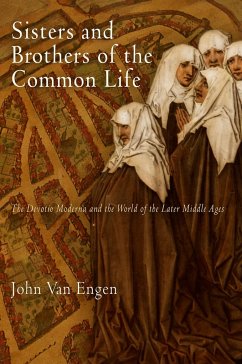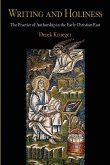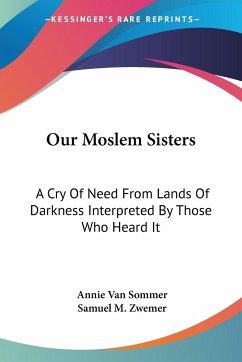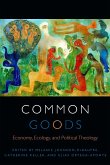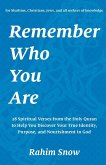John Van Engen
Sisters and Brothers of the Common Life
The Devotio Moderna and the World of the Later Middle Ages
John Van Engen
Sisters and Brothers of the Common Life
The Devotio Moderna and the World of the Later Middle Ages
- Broschiertes Buch
- Merkliste
- Auf die Merkliste
- Bewerten Bewerten
- Teilen
- Produkt teilen
- Produkterinnerung
- Produkterinnerung
John Van Engen is Andrew V. Tackes Professor of History at the University of Notre Dame and author of Rupert of Deutz, among other works.
Andere Kunden interessierten sich auch für
![Writing and Holiness Writing and Holiness]() Derek KruegerWriting and Holiness33,99 €
Derek KruegerWriting and Holiness33,99 €![Imam Husain's Brothers in Arms Imam Husain's Brothers in Arms]() Sayyid Ali KhameneiImam Husain's Brothers in Arms31,99 €
Sayyid Ali KhameneiImam Husain's Brothers in Arms31,99 €![Christian Citizenship in the Middle East Christian Citizenship in the Middle East]() Christian Citizenship in the Middle East32,99 €
Christian Citizenship in the Middle East32,99 €![Our Moslem Sisters Our Moslem Sisters]() Annie Van SommerOur Moslem Sisters22,99 €
Annie Van SommerOur Moslem Sisters22,99 €![Common Goods Common Goods]() Common Goods40,99 €
Common Goods40,99 €![Histories of the Latin American Church Histories of the Latin American Church]() Joel M CruzHistories of the Latin American Church36,99 €
Joel M CruzHistories of the Latin American Church36,99 €![Remember Who You Are Remember Who You Are]() Rahim SnowRemember Who You Are13,99 €
Rahim SnowRemember Who You Are13,99 €-
-
-
John Van Engen is Andrew V. Tackes Professor of History at the University of Notre Dame and author of Rupert of Deutz, among other works.
Produktdetails
- Produktdetails
- Verlag: University of Pennsylvania Press
- Seitenzahl: 448
- Erscheinungstermin: 20. März 2014
- Englisch
- Abmessung: 228mm x 151mm x 32mm
- Gewicht: 684g
- ISBN-13: 9780812223071
- ISBN-10: 0812223071
- Artikelnr.: 40307911
- Herstellerkennzeichnung
- Libri GmbH
- Europaallee 1
- 36244 Bad Hersfeld
- gpsr@libri.de
- Verlag: University of Pennsylvania Press
- Seitenzahl: 448
- Erscheinungstermin: 20. März 2014
- Englisch
- Abmessung: 228mm x 151mm x 32mm
- Gewicht: 684g
- ISBN-13: 9780812223071
- ISBN-10: 0812223071
- Artikelnr.: 40307911
- Herstellerkennzeichnung
- Libri GmbH
- Europaallee 1
- 36244 Bad Hersfeld
- gpsr@libri.de
John Van Engen is Andrew V. Tackes Professor of History at the University of Notre Dame and author of Rupert of Deutz, among other works.
List of Illustrations
Introduction: The Devotio Moderna and Modern History
1. Converts in the Middle Ages
—Conversion as a Medieval Form of Life
—Converts in the Low Countries
—Circles of Converts at Strassburg and Brussels
—Converts Under Suspicion: Legislating Against Beguines and Free Spirits
2. Modern-Day Converts in the Low Countries
—The Low Countries
—Households of Devout Women
—Societies of Devout Men
—Modern-Day Conversion
3. Suspicion and Inquisition
—Suspicion of Devout Practices
—Charge and Counter-Charge in the Mid-1390s
—Sisters Under Inquisition, 1396-1397: Friar Eylard Schoneveld Intervenes
—Resisting the Inquisitor: Legal Tactics
—Awaiting the Bishop's Decision, 1398-1401
4. From Converts to Communites: Tertiaries, Sisters, Brothers, Schoolboys,
Canons
—Tertiaries "Living the Common Life"
—Sisters of the Common Life
—Brothers of the Common Life
—Schoolboys
—Windesheim Canons and Canonesses
—An Option for Enclosure: Male Canons and Female Tertiaries
5. Inventing a Communal Household: Goods, Customs, Labor, and "Republican"
Harmony
—Living Together Without Personal Property
—House Customs and Personal Exercises
—Obedience and Humility in a Voluntary Community
—Labor: Living from the Work of Their Own Hands
—Communal Gatherings and a "Republican" Impulse
6. Defending the Modern-Day Devout: Expansion Under Scrutiny
—Women's Houses and Converting Schoolboys: Burgher Critics at Zwolle
—Friar Matthew Grabow and the Council of Constance
—The Sisters and the Aldermen in Conflict at Deventer: The Women's
Narrative
—Institutionalizing Under Scrutiny
7. Proposing a Theological Rationale: The Freedom of the "Christian
Religion"
—Place in Society: Taking on the "Estate of the Perfect"
—John Pupper of Goch (d. 1475)
—Gospel Law and the Freedom of the Christian Religion
8. Taking the Spiritual Offensive: Caring for the Self, Examining the Soul,
Progressing in Virtue
—Reading, Writing, and the Lay Tongue
—Exhortation in Public and Correction in Private
—Spiritual Guidance and Mutual Reproof
—Modern-Day Devotion: Examining the Self, Making Progress, Experiencing
Peace
Conclusion: Private Gatherings and Self-Made Societies in the Fifteenth
Century
—The Question of an Afterlife
Notes
Bibliography
Index
Acknowledgments
Introduction: The Devotio Moderna and Modern History
1. Converts in the Middle Ages
—Conversion as a Medieval Form of Life
—Converts in the Low Countries
—Circles of Converts at Strassburg and Brussels
—Converts Under Suspicion: Legislating Against Beguines and Free Spirits
2. Modern-Day Converts in the Low Countries
—The Low Countries
—Households of Devout Women
—Societies of Devout Men
—Modern-Day Conversion
3. Suspicion and Inquisition
—Suspicion of Devout Practices
—Charge and Counter-Charge in the Mid-1390s
—Sisters Under Inquisition, 1396-1397: Friar Eylard Schoneveld Intervenes
—Resisting the Inquisitor: Legal Tactics
—Awaiting the Bishop's Decision, 1398-1401
4. From Converts to Communites: Tertiaries, Sisters, Brothers, Schoolboys,
Canons
—Tertiaries "Living the Common Life"
—Sisters of the Common Life
—Brothers of the Common Life
—Schoolboys
—Windesheim Canons and Canonesses
—An Option for Enclosure: Male Canons and Female Tertiaries
5. Inventing a Communal Household: Goods, Customs, Labor, and "Republican"
Harmony
—Living Together Without Personal Property
—House Customs and Personal Exercises
—Obedience and Humility in a Voluntary Community
—Labor: Living from the Work of Their Own Hands
—Communal Gatherings and a "Republican" Impulse
6. Defending the Modern-Day Devout: Expansion Under Scrutiny
—Women's Houses and Converting Schoolboys: Burgher Critics at Zwolle
—Friar Matthew Grabow and the Council of Constance
—The Sisters and the Aldermen in Conflict at Deventer: The Women's
Narrative
—Institutionalizing Under Scrutiny
7. Proposing a Theological Rationale: The Freedom of the "Christian
Religion"
—Place in Society: Taking on the "Estate of the Perfect"
—John Pupper of Goch (d. 1475)
—Gospel Law and the Freedom of the Christian Religion
8. Taking the Spiritual Offensive: Caring for the Self, Examining the Soul,
Progressing in Virtue
—Reading, Writing, and the Lay Tongue
—Exhortation in Public and Correction in Private
—Spiritual Guidance and Mutual Reproof
—Modern-Day Devotion: Examining the Self, Making Progress, Experiencing
Peace
Conclusion: Private Gatherings and Self-Made Societies in the Fifteenth
Century
—The Question of an Afterlife
Notes
Bibliography
Index
Acknowledgments
List of Illustrations
Introduction: The Devotio Moderna and Modern History
1. Converts in the Middle Ages
—Conversion as a Medieval Form of Life
—Converts in the Low Countries
—Circles of Converts at Strassburg and Brussels
—Converts Under Suspicion: Legislating Against Beguines and Free Spirits
2. Modern-Day Converts in the Low Countries
—The Low Countries
—Households of Devout Women
—Societies of Devout Men
—Modern-Day Conversion
3. Suspicion and Inquisition
—Suspicion of Devout Practices
—Charge and Counter-Charge in the Mid-1390s
—Sisters Under Inquisition, 1396-1397: Friar Eylard Schoneveld Intervenes
—Resisting the Inquisitor: Legal Tactics
—Awaiting the Bishop's Decision, 1398-1401
4. From Converts to Communites: Tertiaries, Sisters, Brothers, Schoolboys,
Canons
—Tertiaries "Living the Common Life"
—Sisters of the Common Life
—Brothers of the Common Life
—Schoolboys
—Windesheim Canons and Canonesses
—An Option for Enclosure: Male Canons and Female Tertiaries
5. Inventing a Communal Household: Goods, Customs, Labor, and "Republican"
Harmony
—Living Together Without Personal Property
—House Customs and Personal Exercises
—Obedience and Humility in a Voluntary Community
—Labor: Living from the Work of Their Own Hands
—Communal Gatherings and a "Republican" Impulse
6. Defending the Modern-Day Devout: Expansion Under Scrutiny
—Women's Houses and Converting Schoolboys: Burgher Critics at Zwolle
—Friar Matthew Grabow and the Council of Constance
—The Sisters and the Aldermen in Conflict at Deventer: The Women's
Narrative
—Institutionalizing Under Scrutiny
7. Proposing a Theological Rationale: The Freedom of the "Christian
Religion"
—Place in Society: Taking on the "Estate of the Perfect"
—John Pupper of Goch (d. 1475)
—Gospel Law and the Freedom of the Christian Religion
8. Taking the Spiritual Offensive: Caring for the Self, Examining the Soul,
Progressing in Virtue
—Reading, Writing, and the Lay Tongue
—Exhortation in Public and Correction in Private
—Spiritual Guidance and Mutual Reproof
—Modern-Day Devotion: Examining the Self, Making Progress, Experiencing
Peace
Conclusion: Private Gatherings and Self-Made Societies in the Fifteenth
Century
—The Question of an Afterlife
Notes
Bibliography
Index
Acknowledgments
Introduction: The Devotio Moderna and Modern History
1. Converts in the Middle Ages
—Conversion as a Medieval Form of Life
—Converts in the Low Countries
—Circles of Converts at Strassburg and Brussels
—Converts Under Suspicion: Legislating Against Beguines and Free Spirits
2. Modern-Day Converts in the Low Countries
—The Low Countries
—Households of Devout Women
—Societies of Devout Men
—Modern-Day Conversion
3. Suspicion and Inquisition
—Suspicion of Devout Practices
—Charge and Counter-Charge in the Mid-1390s
—Sisters Under Inquisition, 1396-1397: Friar Eylard Schoneveld Intervenes
—Resisting the Inquisitor: Legal Tactics
—Awaiting the Bishop's Decision, 1398-1401
4. From Converts to Communites: Tertiaries, Sisters, Brothers, Schoolboys,
Canons
—Tertiaries "Living the Common Life"
—Sisters of the Common Life
—Brothers of the Common Life
—Schoolboys
—Windesheim Canons and Canonesses
—An Option for Enclosure: Male Canons and Female Tertiaries
5. Inventing a Communal Household: Goods, Customs, Labor, and "Republican"
Harmony
—Living Together Without Personal Property
—House Customs and Personal Exercises
—Obedience and Humility in a Voluntary Community
—Labor: Living from the Work of Their Own Hands
—Communal Gatherings and a "Republican" Impulse
6. Defending the Modern-Day Devout: Expansion Under Scrutiny
—Women's Houses and Converting Schoolboys: Burgher Critics at Zwolle
—Friar Matthew Grabow and the Council of Constance
—The Sisters and the Aldermen in Conflict at Deventer: The Women's
Narrative
—Institutionalizing Under Scrutiny
7. Proposing a Theological Rationale: The Freedom of the "Christian
Religion"
—Place in Society: Taking on the "Estate of the Perfect"
—John Pupper of Goch (d. 1475)
—Gospel Law and the Freedom of the Christian Religion
8. Taking the Spiritual Offensive: Caring for the Self, Examining the Soul,
Progressing in Virtue
—Reading, Writing, and the Lay Tongue
—Exhortation in Public and Correction in Private
—Spiritual Guidance and Mutual Reproof
—Modern-Day Devotion: Examining the Self, Making Progress, Experiencing
Peace
Conclusion: Private Gatherings and Self-Made Societies in the Fifteenth
Century
—The Question of an Afterlife
Notes
Bibliography
Index
Acknowledgments

